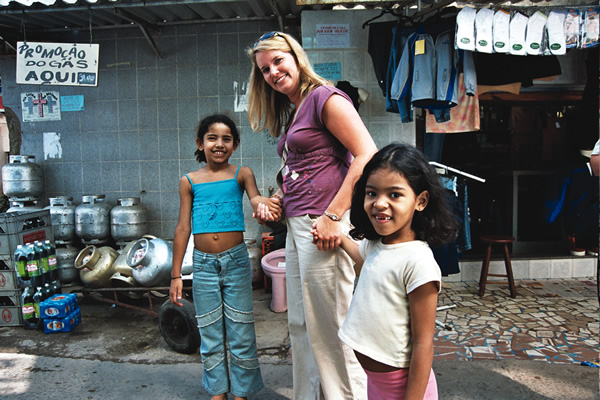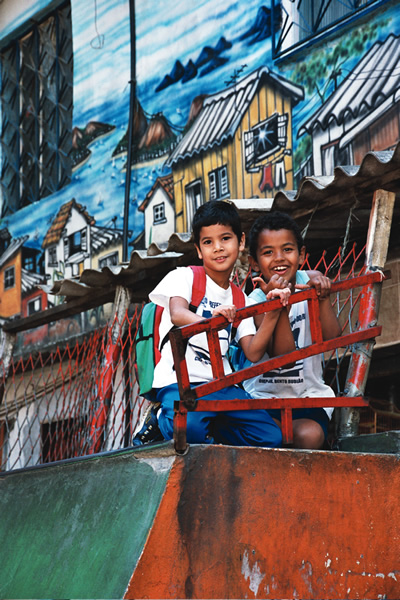Rio’s Favelas: Take a Walking Tour with Responsible Local Programs
Article & Photos By Jim Kane

|
|
Two kids from Rocinha, one of the largest favelas in Rio de Janeiro, befriend traveler Karissa Kruse.
|
My first visit to one of Rio’s misunderstood and often feared favelas in early 2003 was less than propitious. While we were driving through an urban community a French tourist leaned across me to video the bustling street life outside our closed minivan window. Her insensitivity was greeted with mocking gestures and shouts.
Fortunately, there are more gratifying ways to visit a favela — for residents and visitors alike — and to learn about these complex neighborhoods. I’ve returned several times to try to better understand life in one of Rio’s 800 favelas, where nearly a quarter of the city's eight million residents live.
Not long after my unfortunate first trip to Rocinha, I met Rejane Reis. She’s been giving walking tours of Rocinha for nine years and founded the Favela Tourism Workshop, which helps dozens of local youth learn about themselves and their city, as well as about foreign visitors.
“When I first started giving tours in Rocinha,” Rejane said at our first meeting, “I noticed that some local kids would always run up and ask for money. I decided that instead of handing them money we would educate them on tourism — how to interact with foreigner visitors and at the same time learn about their own city, Rio de Janeiro.” From there started the Rocinha Tourism Workshop, which accepts between 20 to 40 students at a time, depending on the high or low tourist seasons.
Participants attend afternoon classes two times per week, receive lunch and English and Spanish classes, and occasionally take field trips to the marvelous icons of the city: Sugarloaf mountain, Tijuca forest, and Corcovado mountain with its monumental Christ the Redeemer statue overlooking the city and the bay.
The teachers and local tour guides serve as mentors for the kids. Edson, in his late 40s, is like a father figure to many of the program’s youth. “Not all of these kids will become tour guides,” he commented to me during our recent visit, “but all will become citizens. All will learn respect for themselves and know how to treat others.” Whatever they decide to do after the program, Edson believes, they will be better for having attended.
“How do other kids from Rocinha look at these kids involved in the Tourism Workshop?” asked Barbara, a mediator from Rhode Island, during a rest break in our walk. “Do they tease them for belonging?”
“No,” Edson replied. “The other kids look up to them. Seeing them, they want to join the program.”

|
|
Rocinha school boys pause for a photo in one of the favela’s community playgrounds.
|
Roberto, 23, George, 16, and Hugo, 19, joined us on our visit this past August. Although none of the boys spoke much English, they all took great pride in pointing out sights in the favela. They were exceptionally caring and protective of their foreign charges, whether we were crossing a busy street or navigating Rocinha’s mazelike alleys and stairways.
We had arranged with Rejane to invite the boys to Ipanema Beach after our walking visit of their neighborhood for a friendly game of beach volleyball. None of us was particularly skilled at the game; it was just a fun way to spend more time with the boys and to connect on a human level, eliminating the language and cultural barriers through sport and play.
We mixed up the teams each time. Brazil vs. the U.S. and England became Brazil and the U.S. vs. Brazil and England and so on. Edson usually played the role of referee, another of his jobs when he wasn’t guiding. We all had a great time laughing and cheering each other on.
Afternoon turned to evening, and after a while it was time for Rejane, Edson, and the boys to get back to Rocinha. “Edson,” I asked. “How do you say ‘Well played’ in Portuguese?” He told me. With hugs and high fives, I said to each one, “Bem jogado!”
Rejane and I spoke a few days later. “So, what did the kids think about our time together?” I asked. “They ran to tell the others what a great experience they had!”
Edson was right: whether any of them would become tour guides in the future was irrelevant. Each of them was becoming a proud citizen of Rocinha and of Rio de Janeiro.
Guidelines for Visiting a Favela
Responsibly
Photography: It is strongly advised not to photograph people on the street. Reactions could range from ambivalent to offended to much worse. If you don’t get explicit approval from your potential subject to take a picture, don’t. The easiest solution is to leave the camera at home.
Transport: For me, walking is the only way to visit. How else can you:
-
Visit the health clinic, as we did in August, where we met and spoke with the director about the issues she faces every day.
-
Look over the shoulders of retired men playing cards in the public areas.
-
Marvel at the dense tangle of telephone wires where many residents tap into the official lines.
-
Explore the steep, mazelike alleys and stairways.
-
See boys flying kites, formerly used to alert the drug lords of police activity (nowadays other signals are used for warnings).
-
Smell the fruits, meat, fish, and dozens of other foods that are bought and sold in the bustling markets and stalls.
Guides: Go local. Only visit a favela with an experienced local guide. Never walk through a favela alone or even with a Brazilian friend from elsewhere in the city.
To Make a Lasting Impression:
|
JIM KANE has written
frequently for Transitions Abroad on travel with a community-based
emphasis. He is the founder and CEO of award-winning Culture
Xplorers, a recognized leader in sustainable travel.
|
